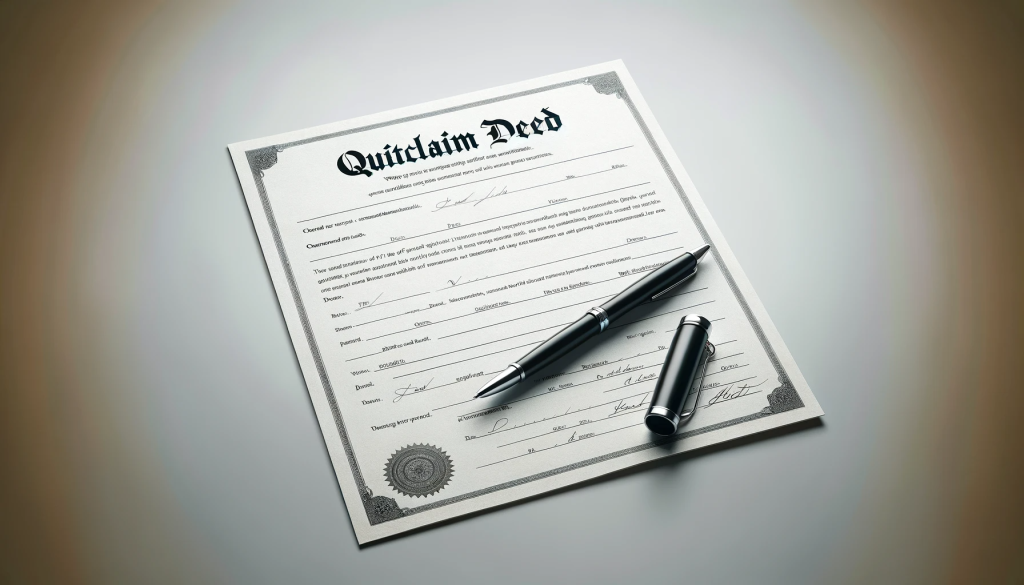
The quitclaim is famous for being the simplest way to give up an interest in real estate. Unlike a warranty deed, the quitclaim grants whatever interest a person has to the other person, but offers no assurances that the title is clear.
Once a quitclaim is signed and recorded, can the deed be challenged in court? Yes, it can. Recording your deed only provides notice of your ownership claim to the public. It does not guarantee ownership.
Because quitclaims make no guarantees about the property’s title or condition, a court that hears a challenge to your deed will simply be examining the quitclaim to find out if the transfer was legally correct. So, if you received an interest through a quitclaim deed, you’ll want to be able to show that the grantor properly conveyed the deed to you. In this article, we take a look at why you might hold a quitclaim deed in the first place, and how to hold onto your property if that deed is challenged.
Why a Homeowner Receives a Quitclaim Deed
A quitclaim deed isn’t used in the arm’s-length transactions typical when a home goes on the market. Instead, it’s commonly used:
- To transfer property among people who know each other — often from one family member to another.
- To transfer complete ownership to just one of two co-owners.
- To take one divorcing partner off the home title — leaving the entire home with the other ex-spouse. Note: As a quitclaim only releases the deed and not the mortgage, selling or refinancing is common when the home in a divorce settlement includes a home with a mortgage.
- When owners marry, and one wishes to transfer a home out of sole ownership and place it in the names of the newly married pair. Note: Consider having a real estate attorney review potential tax or inheritance consequences.
There are additional ways for a quitclaim deed to come into play in home ownership. A few more examples are:
- To reflect an owner’s name change.
- To change the title’s vesting — that is, the way co-owners hold title.
- To move property into or out of an LLC, sole proprietorship, corporation, or family trust.
- In a tax sale, by which the government sells and conveys a foreclosed house with the ownership interest it claimed, and provides the buyer no warranty against title defects.
- As a deed of release to clear up any possible cloud on title. Indeed, a title insurer or lender may recommend having someone who might have a claim execute a quitclaim deed to clear up a title before insuring or approving a loan on it. Note: If you need to clear up a cloud on your title and are contemplating a quitclaim deed to do the job, do seek advice from a real estate law firm or title agency.
- When a parent or other relative wishes to pass along a home rather than let the home head for probate. Note: Using a quitclaim to pass an asset along after death might not be the best approach. A beneficiary of a home that’s instead left in a will gets a stepped-up cost basis — relief from possibly large capital gains taxes if they wish to sell their bequeathed house.
How a Quitclaim Deed Gets Challenged

It’s no mean feat to challenge a recorded quitclaim deed. The challenger has the burden of proof that the deed is not valid. Why would it not be valid? The challenger could claim forgery, for example, or that the grantor signed under pressure.
When defending a quitclaim deed against a challenge, a lawyer might contact witnesses to the deed’s execution, or seek out relevant correspondence to examine the grantor’s intent to leave you with the property interest. Or the grounds for a challenge could involve legal technicalities.
Consider these possible challenges to your deed:
- Erroneous information on the deed. Be sure the correct property description appears on your deed. The complete legal description of any address is available from the Recorder of Deeds in the property’s county. What can you do to defend your deed if the description has an error? We recommend updating a flawed deed before it becomes a problem.
- Notary and recorder issues: A quitclaim deed should be signed in front of a notary public, for several reasons. Notarization indicates that the grantor signed it over to you with understanding and free will. A quitclaim that hasn’t been notarized can’t be recorded. And if you don’t record the deed, you could lose it. Moreover, an unrecorded deed only binds you and the grantor. Another person could come along and challenge your unrecorded deed.
Remember that recording is public notice of your ownership. If you record your deed late — after a different claim was recorded by someone else — you may have lost your ability to defend your deed, under state law. Be sure to read about the order of recording and its effect.
- Fraud or duress. Quitclaims signed under pressure can be challenged on the grounds that coercion or threats were used to extract the property — or even that the signature on a notarized deed was faked. A lawyer can advise you on how to gather the facts and witnesses to show the grantor signed the deed knowingly and deliberately to you.
- Mental capacity: Lack of mental capacity could be the result of mental illness, cognitive decline or disability, an accident, or another form of serious impairment. To defend the deed against this type of challenge, your lawyer may seek the grantor’s medical records as well as expert opinions and the impressions of witnesses.
State law sets forth the allowable time period for filing a petition to challenge a property deed. After a certain amount of time passes, most deeds, quitclaims included, may not be unsettled. This is so, even if they were void ab initio (void from the start, that is — such as forged deeds).
If anyone believes they can challenge your deed, check the time limits supplied by any statute of limitations, as well as the marketable record title laws of the home’s state. These will vary. Texas law, one real estate attorney notes, has spent less time ironing out the “dire consequences” of quitclaims than other states, which are more forgiving.
Defending the Deed for Good: The Quitclaim, Insurance, and Quiet Title Actions
Owner’s title insurance can help protect a deed holder from court challenges, and can cover the costs of having title problems fixed. So, can you get title insurance for your quitclaim deed? Not necessarily. A title insurer expects the previous owner to provide warranties, and that didn’t happen with a quitclaim.
As a non-warranty deed, the quitclaim does not guarantee the integrity of the title. Therefore, by the very nature of the quitclaim deed, its recipient has no warranty against the person who transferred it. The recipient may be getting no property at all, if the grantor had no valid ownership claim. Bad actors have used quitclaim deeds to convey property they do not own, and take off with a buyer’s funds.
A holder of a quitclaim deed can undertake a quiet title action in the county if needed to prove clear title for good. This is one option available to real estate investors who receive deeds through quitclaims in tax sales. In a quiet title action, the court can correct defects in the home’s conveyance history, and affirm the owner’s rightful position in the chain of title.
Conclusion: An Important Tool in the Right Situation
With a quitclaim, the emphasis is on a grantor disclaiming or giving up an interest in property, rather than conveying it. Used appropriately, it’s an important tool. Yet to be considered valid and complete, a quitclaim should always follow a warranty deed. And those who accept a quitclaim in exchange for a payment should engage in proactive self-defense: hire a title company to perform a title search and provide an assessment first.
Photo credit: Soon Santos, via Unsplash.
